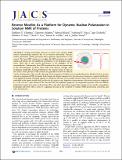Reverse Micelles As a Platform for Dynamic Nuclear Polarization in Solution NMR of Proteins
Author(s)
Valentine, Kathleen G.; Mathies, Guinevere; Bedard, Sabrina; Nucci, Nathaniel V.; Dodevski, Igor; Stetz, Matthew A.; Wand, A. Joshua; Griffin, Robert Guy; Can, Thach V; ... Show more Show less
DownloadGriffin_Reverse micelles.pdf (1.489Mb)
PUBLISHER_POLICY
Publisher Policy
Article is made available in accordance with the publisher's policy and may be subject to US copyright law. Please refer to the publisher's site for terms of use.
Terms of use
Metadata
Show full item recordAbstract
Despite tremendous advances in recent years, solution NMR remains fundamentally restricted due to its inherent insensitivity. Dynamic nuclear polarization (DNP) potentially offers significant improvements in this respect. The basic DNP strategy is to irradiate the EPR transitions of a stable radical and transfer this nonequilibrium polarization to the hydrogen spins of water, which will in turn transfer polarization to the hydrogens of the macromolecule. Unfortunately, these EPR transitions lie in the microwave range of the electromagnetic spectrum where bulk water absorbs strongly, often resulting in catastrophic heating. Furthermore, the residence times of water on the surface of the protein in bulk solution are generally too short for efficient transfer of polarization. Here we take advantage of the properties of solutions of encapsulated proteins dissolved in low viscosity solvents to implement DNP in liquids. Such samples are largely transparent to the microwave frequencies required and thereby avoid significant heating. Nitroxide radicals are introduced into the reverse micelle system in three ways: attached to the protein, embedded in the reverse micelle shell, and free in the aqueous core. Significant enhancements of the water resonance ranging up to ∼−93 at 0.35 T were observed. We also find that the hydration properties of encapsulated proteins allow for efficient polarization transfer from water to the protein. These and other observations suggest that merging reverse micelle encapsulation technology with DNP offers a route to a significant increase in the sensitivity of solution NMR spectroscopy of proteins and other biomolecules.
Date issued
2014-01Department
Massachusetts Institute of Technology. Department of Chemistry; Francis Bitter Magnet Laboratory (Massachusetts Institute of Technology)Journal
Journal of the American Chemical Society
Publisher
American Chemical Society (ACS)
Citation
Valentine, Kathleen G., Guinevere Mathies, Sabrina Bédard, Nathaniel V. Nucci, Igor Dodevski, Matthew A. Stetz, Thach V. Can, Robert G. Griffin, and A. Joshua Wand. “Reverse Micelles As a Platform for Dynamic Nuclear Polarization in Solution NMR of Proteins.” Journal of the American Chemical Society 136, no. 7 (February 19, 2014): 2800–2807. © 2014 American Chemical Society
Version: Final published version
ISSN
0002-7863
1520-5126